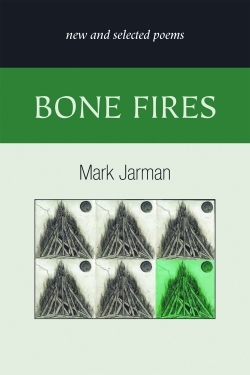Bone Fires
New and Selected Poems
There are many charms in reading a writer’s selected poems, not least of which is perspective. The reader feels like an airplane passenger watching one landscape turn into another. It is possible see where the plains cede to foothills and foothills to mountains—in short, one seems to notice everything at once.
In Bone Fires: New and Selected Poems, it is evident that Mark Jarman’s work has clear themes, the approach to which evolves as one works through the collection. In his earliest poems, on loan from his 1978 collection North Sea, domesticity is the central theme. Parents and children fill pieces that are mainly uplifting. Elsewhere, these same figures are examined with a sharper eye. In the poems from his 1981 collection, The Rote Walker, the father is less idealized. He becomes irritated at his son’s questions about the afterlife and his explanation—that those who loved will be greeted by love and those who didn’t will be at a loss—is one that haunts the poet. This explanation also appears in one of Jarman’s new poems, “Snoring,” as the now older poet tries to create his own picture of heaven. “The loveless and unlovable” find love in death or “they find another welcome, the rich dark of slumber, which passes all understanding.” This theme of faith is the most persistent in Jarman’s work, and he tackles it with more humanity than any of his contemporaries. The faith expressed here seems personal and therefore accessible.
Jarman’s new poems are as good as any of his career. The poem “Time Machine” is particularly apt in its opening lines: “When we arrive, the future will adore us / As being so much better than it expected.” Bone Fires serves well as an introduction to the poet’s work, but it must also be welcome to pre-existing Jarman fans. Although there are only 19 new poems, they tackle the full range of his obsessions—faith, of course, but also family, history, and regret. At 58, Jarman is by no means at the end of his career, in spite of the common assumption that accompanies a book of selected works. This poet seems to anticipate this assumption and answers it in the opening poem, “How My Sister, My Mother, and I Still Travel Down Balwearie Road,” which concludes, “It is still cold, still dark, just as I said, and late. But not as late as I thought.”
Reviewed by
Erica Wright
Disclosure: This article is not an endorsement, but a review. The publisher of this book provided free copies of the book to have their book reviewed by a professional reviewer. No fee was paid by the publisher for this review. Foreword Reviews only recommends books that we love. Foreword Magazine, Inc. is disclosing this in accordance with the Federal Trade Commission’s 16 CFR, Part 255.

